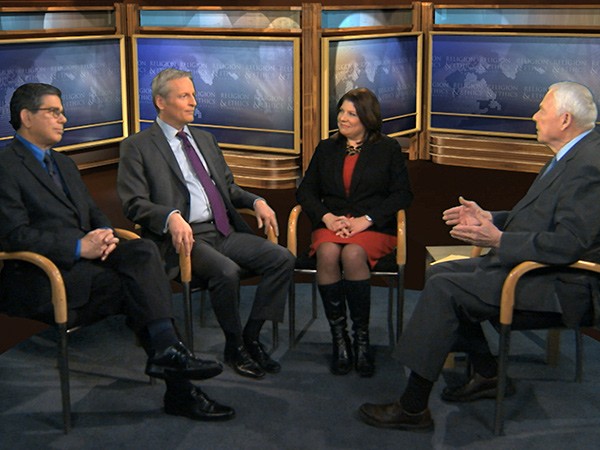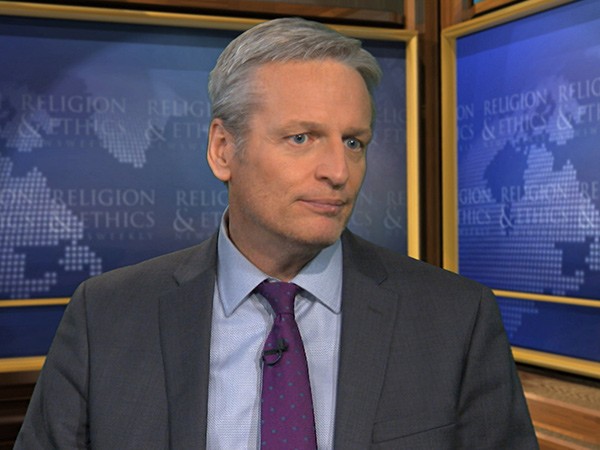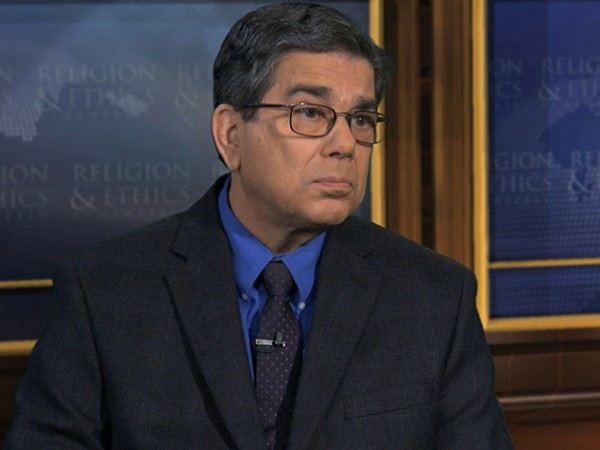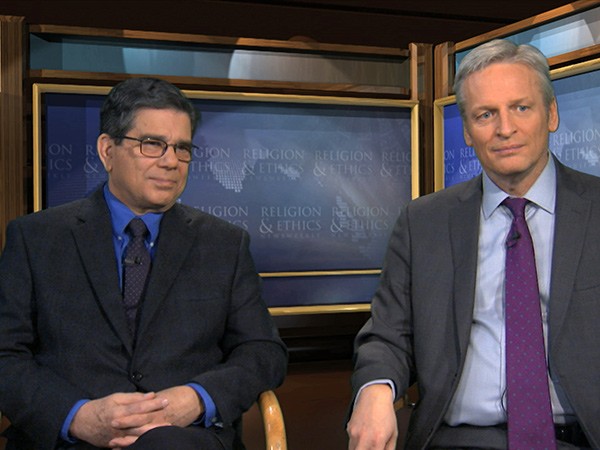 BOB ABERNETHY, host: Humanitarian officials say a ceasefire in Syria must take hold so that emergency aid can reach civilians who have been trapped amid escalating fighting. Some convoys have reached besieged areas, but tens of thousands of people are in desperate need. Meanwhile, according to a new report from the International Organization for Migration, so far in 2016 more than 100,000 asylum-seekers from Syria, Iraq, North Africa and other areas have traveled across the Mediterranean to Greece and Italy. Last year, the number didn’t top 100,000 until June. Hoping to stem the tide, several European nations have begun placing severe new restrictions on their borders, leaving tens of thousands of migrants stranded.
BOB ABERNETHY, host: Humanitarian officials say a ceasefire in Syria must take hold so that emergency aid can reach civilians who have been trapped amid escalating fighting. Some convoys have reached besieged areas, but tens of thousands of people are in desperate need. Meanwhile, according to a new report from the International Organization for Migration, so far in 2016 more than 100,000 asylum-seekers from Syria, Iraq, North Africa and other areas have traveled across the Mediterranean to Greece and Italy. Last year, the number didn’t top 100,000 until June. Hoping to stem the tide, several European nations have begun placing severe new restrictions on their borders, leaving tens of thousands of migrants stranded.
We want to talk more about the moral dimensions of this crisis. With me are our managing editor Kim Lawton, Michel Gabaudan, president of Refugees International, and Mark Smith, senior director for humanitarian emergencies at the Christian group World Vision. Welcome to each of you.
Mark, let me begin with you. Looking at all the refugees, the millions of them, it seems hopeless. How do you avoid, you and everybody you’re working with, how do you avoid that?
MARK SMITH (World Vision): I would say that our staff don’t have that sense of hopelessness. I’d say there’s frustration on their part seeing the desperate plight of so many people. I think one of the things that we’re in the business of doing is trying to bring hope to people who are hopeless themselves. Sometimes it’s only temporary. Other times we’re trying on longer-term solutions. But I think our staff are really wanting to bring hope to people.
KIM LAWTON: What are the moral obligations that not just your staff but the international community has toward, you know, all of these people, Michel?
 MICHEL GABAUDAN (Refugees International): Well, you know, at the end of the Second World War to try to prevent the resurge into the horrors we saw at the time, the community of nations did agree to a certain number of international instruments to be more generous to civilians caught in conflict, and the international humanitarian law was precisely trying to put some rules to how we conduct war and to protect civilians. These have been absolutely violated by the Assad regime, to a large extent by the Russians in indiscriminate bombings, to a lesser extent but still by some of the other groups fighting there. And the second set of regulations was one to protect refugees. The Refugee Convention oblige the state to sign it to receive people who flee for their protection, and we’re seeing in Europe where almost all the countries sign the convention that this is not how they are reacting at present. So we failed the Syrians.
MICHEL GABAUDAN (Refugees International): Well, you know, at the end of the Second World War to try to prevent the resurge into the horrors we saw at the time, the community of nations did agree to a certain number of international instruments to be more generous to civilians caught in conflict, and the international humanitarian law was precisely trying to put some rules to how we conduct war and to protect civilians. These have been absolutely violated by the Assad regime, to a large extent by the Russians in indiscriminate bombings, to a lesser extent but still by some of the other groups fighting there. And the second set of regulations was one to protect refugees. The Refugee Convention oblige the state to sign it to receive people who flee for their protection, and we’re seeing in Europe where almost all the countries sign the convention that this is not how they are reacting at present. So we failed the Syrians.
ABERNETHY: Can anybody in these days and in the kinds of conditions that people are in, can anybody abide by rules?
SMITH: Yes, they should, and we think they should. And one of our advocacy efforts are focused on trying to pressure, you know, the actors in the region to abide by international humanitarian norms and laws.
LAWTON: But what are the ethical, you know, moral obligations of these countries to the people in their countries who say, we are overwhelmed; all these people are taking resources from us. You know, how do they balance those questions?
 GABAUDAN: I think you’re making an important point. The countries neighboring Syria—Turkey, Lebanon, Jordan—have been extremely generous to the refugees. When they started fleeing, they kept their borders open, etc. But they’re bursting at the seams now, and that’s why we see people moving out. I think perhaps where we have failed is not to give sufficient support to these countries not only in humanitarian aid but also in serious development aid so that the host communities would feel that the world was sharing the burden. And that’s a feeling that they don’t have.
GABAUDAN: I think you’re making an important point. The countries neighboring Syria—Turkey, Lebanon, Jordan—have been extremely generous to the refugees. When they started fleeing, they kept their borders open, etc. But they’re bursting at the seams now, and that’s why we see people moving out. I think perhaps where we have failed is not to give sufficient support to these countries not only in humanitarian aid but also in serious development aid so that the host communities would feel that the world was sharing the burden. And that’s a feeling that they don’t have.
LAWTON: And what about in Europe?
SMITH: Well, in Europe they’re facing a crisis that to a certain degree is a part of international making in that, as Michel has mentioned, if there is not enough aid for the countries immediately surrounding Syria, you’re starting to see a movement of people into the European theatre. And they’re now dealing with this. Unfortunately, a lot of these countries are making decisions that are not necessarily best for the people who are coming in but rather kind of serving their own interests.
ABERNETHY: If everybody doesn’t do more right now, the dangers to children growing up, to people who have no jobs are tremendous and dangerous to everybody around them.
SMITH: One of the things that, you know, we have really wanted to focus on in terms of messaging and, you know, Refugees International, World Vision and others are part of an initiative called No Lost Generation. Because one of the things that we are really concerned about is losing an entire generation of children. You know, the Syrian children, I mean the numbers are staggering in terms of 44 percent, a drop of 44 percent in enrolled schoolchildren. We’re seeing, you know, 17 percent of children who are outside of camps, only 17 percent are attending school, and so you’re losing potentially a generation of children.
 LAWTON: And what are the responsibilities of the US.? You know, we talk about the immediate countries in Europe. What about for us, briefly?
LAWTON: And what are the responsibilities of the US.? You know, we talk about the immediate countries in Europe. What about for us, briefly?
GABAUDAN: Well, the US has been the leader in terms of responding to the emergency through the funding of the humanitarian agencies. We have to recognize that. However, the total funding remains at 60 percent of needs. So we need to do much more. And the US I know is trying to get more donors to come to the table. We hope they’ll succeed in that, but we would also like to see more from the US in that. And the second point where the US could help right now is in helping with what we would call an orderly departure from Turkey, from Jordan and from Lebanon through a series of means—can be resettlement, can be student loans, can be family reunification. There are all kinds of ways to try to help people leaving in an orderly manner.
ABERNETHY: Michel, our time is up, I’m sorry to say. Thanks to you, Michel, thanks to Mark of World Vision, and thanks to Kim Lawton of this program.

 BOB ABERNETHY, host: Humanitarian officials say a ceasefire in Syria must take hold so that emergency aid can reach civilians who have been trapped amid escalating fighting. Some convoys have reached besieged areas, but tens of thousands of people are in desperate need. Meanwhile, according to a new report from
BOB ABERNETHY, host: Humanitarian officials say a ceasefire in Syria must take hold so that emergency aid can reach civilians who have been trapped amid escalating fighting. Some convoys have reached besieged areas, but tens of thousands of people are in desperate need. Meanwhile, according to a new report from  MICHEL GABAUDAN (Refugees International): Well, you know, at the end of the Second World War to try to prevent the resurge into the horrors we saw at the time, the community of nations did agree to a certain number of international instruments to be more generous to civilians caught in conflict, and the international humanitarian law was precisely trying to put some rules to how we conduct war and to protect civilians. These have been absolutely violated by the Assad regime, to a large extent by the Russians in indiscriminate bombings, to a lesser extent but still by some of the other groups fighting there. And the second set of regulations was one to protect refugees. The Refugee Convention oblige the state to sign it to receive people who flee for their protection, and we’re seeing in Europe where almost all the countries sign the convention that this is not how they are reacting at present. So we failed the Syrians.
MICHEL GABAUDAN (Refugees International): Well, you know, at the end of the Second World War to try to prevent the resurge into the horrors we saw at the time, the community of nations did agree to a certain number of international instruments to be more generous to civilians caught in conflict, and the international humanitarian law was precisely trying to put some rules to how we conduct war and to protect civilians. These have been absolutely violated by the Assad regime, to a large extent by the Russians in indiscriminate bombings, to a lesser extent but still by some of the other groups fighting there. And the second set of regulations was one to protect refugees. The Refugee Convention oblige the state to sign it to receive people who flee for their protection, and we’re seeing in Europe where almost all the countries sign the convention that this is not how they are reacting at present. So we failed the Syrians. GABAUDAN: I think you’re making an important point. The countries neighboring Syria—Turkey, Lebanon, Jordan—have been extremely generous to the refugees. When they started fleeing, they kept their borders open, etc. But they’re bursting at the seams now, and that’s why we see people moving out. I think perhaps where we have failed is not to give sufficient support to these countries not only in humanitarian aid but also in serious development aid so that the host communities would feel that the world was sharing the burden. And that’s a feeling that they don’t have.
GABAUDAN: I think you’re making an important point. The countries neighboring Syria—Turkey, Lebanon, Jordan—have been extremely generous to the refugees. When they started fleeing, they kept their borders open, etc. But they’re bursting at the seams now, and that’s why we see people moving out. I think perhaps where we have failed is not to give sufficient support to these countries not only in humanitarian aid but also in serious development aid so that the host communities would feel that the world was sharing the burden. And that’s a feeling that they don’t have. LAWTON: And what are the responsibilities of the US.? You know, we talk about the immediate countries in Europe. What about for us, briefly?
LAWTON: And what are the responsibilities of the US.? You know, we talk about the immediate countries in Europe. What about for us, briefly?




